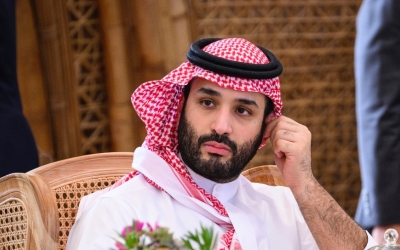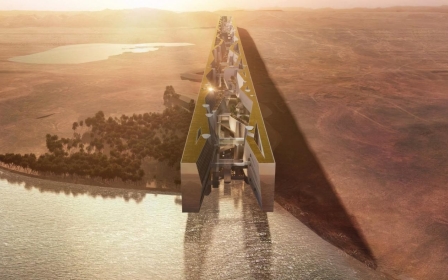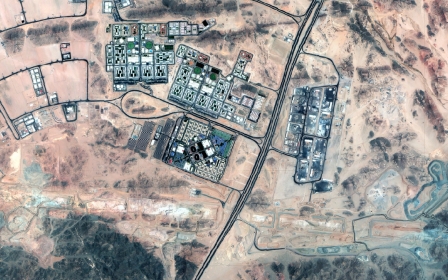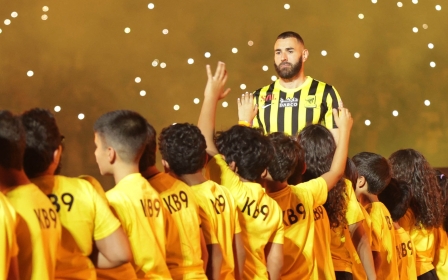Opec bans reporters from conference amid sagging crude prices

Opec has cancelled accreditation for reporters from three major news organisations ahead of a conference in Vienna where the head of BP and the European Union’s top energy official are set to speak.
The Saudi-led oil cartel withdrew accreditation from Reuters, the Wall Street Journal, and Bloomberg, the latter reported on Wednesday.
“We are very concerned by the prospect of OPEC excluding certain journalists, including from Bloomberg, from next week’s seminar,” Bloomberg News said in a statement.
“For the sake of market transparency, we strongly advocate for OPEC to allow journalists from relevant global news outlets to attend.”
Reuters and the WSJ did not respond to MEE's request for comment.
New MEE newsletter: Jerusalem Dispatch
Sign up to get the latest insights and analysis on Israel-Palestine, alongside Turkey Unpacked and other MEE newsletters
The move is the latest by Opec to exert greater control over media coverage as the cartel struggles to prop up energy prices.
In May, Opec snubbed reporters from Bloomberg, Reuters, and the WSJ ahead of a June meeting to set future production.
And in October 2022, Saudi Energy Minister Prince Abdulaziz bin Salman refused to answer a question from a Reuters correspondent, saying that "Reuters did not do a proper job" with regard to a story published by the news agency.
“I’m not talking to Reuters until you respect the source, which is the energy minister himself on behalf of the Saudi government,” he said.
'Opec's house'
Opec secretary general Haitham al-Ghais defended the move during a press conference after the meeting, saying: “This is our house.”
This year, Saudi Arabia has corralled members of Opec to slash output, but the cuts have not had the desired effect of boosting prices, which have been weighed down by fears of a global economic slowdown and resilient production in Russia.
Saudi Arabia’s energy minister, Prince Abdulaziz, has grown frustrated with the limited impact of cuts. He warned speculators they would be “ouching like hell” if they doubted his willingness to support prices, telling them to “watch out” ahead of the June meeting between Opec and a group of producers led by Russia.
Analysts say that Abdulaziz is likely coming under pressure from his half-brother, Crown Prince Mohammed bin Salman, to support oil prices. The crown prince needs high prices to fund mega-projects like resorts on the Red Sea and Neom, a $500bn megacity.
In an interview with the Discovery Channel, Mohammed bin Salman promised that Neom will “compete with Miami”- the glitzy US coastal party and tech city - once it’s completed.
Brent, the international benchmark, was trading at $74 a barrel on Wednesday at 8pm (GMT). Despite two production cuts in eight months, oil prices have sunk 40 percent from their May 2022 highs of $125 a barrel.
The Opec meeting comes amid signs of friction between Russia and Saudi Arabia over energy policy. Russian President Vladimir Putin has found Middle East leaders like Mohammed bin Salman useful allies as he faces isolation in the West as a result of his Ukraine invasion.
Saudi Arabia has tried to maintain a neutral position on Ukraine. The kingdom hosted Ukrainian President Volodymyr Zelensky at an Arab League Summit in May but has refused to sign on to western sanctions against the Kremlin.
But Russia is pumping more oil and selling it at steep discounts, to make up for western sanctions. Discounts on Russian oil compared to the price of Brent are currently at about $26-$27 per barrel, Russia’s deputy prime minister, Alexander Novak, told reporters.
While Saudi Arabia is selling more oil to Europe, Russia is taking market share in bigger growth markets in Asia. Russia overtook Saudi Arabia as China’s top crude exporter in April and the two are now vying for first place.
Middle East Eye delivers independent and unrivalled coverage and analysis of the Middle East, North Africa and beyond. To learn more about republishing this content and the associated fees, please fill out this form. More about MEE can be found here.





